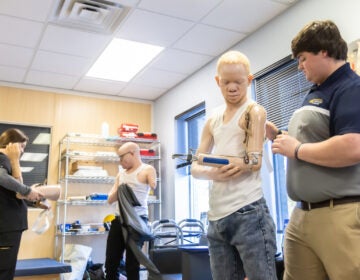How to make compost WITHOUT fall leaves
ListenMike McGrath shares tips for gardening in the Northwest, using sheep for weed control, how to care for a row of blue spruce, using banana peels in your compost pile, how to rotate tomatoes to keep them healthy, the best way to keep cats out of an urban garden, and how to make compost without fall leaves.
Question of the Week:
“You often mention that one of the secrets to making successful compost is to include sufficient “brown” material in the mix, specifically shredded fall leaves. But in the fall, I mow all my leaves and use the shredded leaves as mulch for my shrub and flower borders. As a result, I have little left over to use in my compost pile. I’m hoping you have some suggestions for other sources of brown material. Thank you,”
— Bonnie in Centreville, Delaware
How to make compost without fall leaves »
-

Photo by Flickr user M. Dolly
Highlights from show for May 3, 2014:
Gardening in the Northwest
Chuck’s struggling to grow healthy plants in his organic garden in Western Washington State. Mike remembers seeing a lot of innovative gardens on a trip to the Northwest. Mike explains: “The weather is much milder than
people think… but there just is not often enough sunlight or temperature in the outside world to grow the most popular fruiting crops that people remember from the east coast, tomatoes, peppers, cucumbers … peoples outdoor gardens were cold crops, root crops, leafy crops like salad greens and potatoes.” Mike thinks that Chuck’s garden will be greatly improved if he installs raised beds. Mike also suggests that he try out “hobby greenhouse” methods like using a high-tunnel or row covers. These covers will extend Chuck’s growing season and help him concentrate sunlight to grow fruiting crops.
Shrub-taming sheep?
Julie from Northport, Michigan wants to graze sheep on her new pasture. But there’s one problem: The pasture is overrun with the aggressive shrub Autumn Olive. Mike says: “With many of these so-called invasive shrubs, goats are one of the answers! There are professional weed-eating goats that go into fragile ecosystems.” Since sheep, like goats, enjoy eating new shoots and leaves from shrubs Mike thinks Julie’s flock might aid her in her reclamation effort. He recommends that she cut back the Autumn Olive working in sections over a few seasons and let her sheep do the rest.
-

Photo by Flickr user Vida Dimovska
Caring for a row of blue spruce
Mark’s blue spruce pines are thinning and developing white blotches. Mike tells Mark that this is a common problem and the white blotches are harmless “spruce schmutz” caused by leaking sap. “All of these evergreens have a tendency to brown-out at the bottom and have some branch loss at the bottom if they don’t receive full sun on all sides. These beautiful spruces that we see in the occasional front yard that have that skirt that covers their feet, that goes all the way to the ground and is perfect? They’re getting all sun on all sides, they’re not getting any kind of shade.” And Mark’s spruces definitely get some shade. Mike thinks that these trees will be just fine. He recommends that Mark do some pruning to create better airflow between the trees.
Banana peels in compost?
Jay from Wyncote, Pennsylvania is from a family of avid gardeners. His sister informed him that he shouldn’t put banana peels in his compost. He calls Mike to see if this is compost myth or compost gospel. Mike thinks it’s a myth: “I can tell you that banana peels have a long gardening lore and are objects of almost veneration. There are people who religiously burry banana peels around their plants with the theory that bananas themselves are loaded with potassium, potassium of course is one of the three essential plant nutrients and they think this is a good way to get potassium to their plants … The only problem with banana peels and citrus rinds and other things of that nature … is that they don’t compost at the same rate as apple cores or lettuce leaves.” Mike thinks that bananas are just as good, or better, than other kitchen waste you can add to your compost pile. He recommends chopping the banana peels before adding them to the pile to speed up their decomposition.
-

Photo by Flickr user szczel
Tomato rotation solutions
Leigh from Princeton, New Jersey has a raised bed garden with limited space. She knows she should rotate her tomatoes, but she doesn’t want to throw the rest of her garden into shade. Mike thinks Leigh’s tomatoes are at a high risk for Verticillium wilt, but she might be able to continue planting in the same area if she selects resistant or grafted varieties or performs a major soil swap before planting. “What you want is tomatoes that on the plant tag or on the seed packet have the letters V and F, that’s Verticillium and Fusarium … those are the disease resistant plants … You have a lot of hip nurseries in your area, see if anyone is selling grafted tomatoes … these are tomato varieties that are grafted onto the roots of a different variety and the root system is probably the most known resistant to these soil born wilts. So if you plant them correctly, make sure that graft is never buried, the roots will be the only thing that enters the soil and that’s a disease resistant tomato .. there’s no limit to the varieties that they could put open these roots.”
Keeping cats out of an urban garden
Dana from North Philadelphia, Pennsylvania and her friends have been gardening in a vacant lot for the past five years. She calls Mike because stray cats are leaving dangerous droppings all over the area. Mike urges Dana to act quickly to fix this problem. “This is very common. Ninety-percent of people misunderstand these dangers. The danger is
immediate, it’s not being transferred to the vegetables. Obviously everybody knows that pregnant women shouldn’t go near this material. But there is a danger to the children being in an area where urban cats have done their business. And there’s a physical danger to people like you if you’re not wearing very heavy gloves when you touch this material.” Mike suggests that Dana reinforce the chain-link fence around the lot with cheap chicken wire. By running wire around the bottom of the fence and building a baffle near the top, she’ll keep out most of these pesky felines. Mike also reminds Dana that the soil in this lot is most likely full of lead from the old buildings that once stood on it and all gardeners should wear masks and gloves to avoid inhaling and touching dangerous lead particles.
Electrified squirrel deterrent
Jeff from New York has a squirrel problem. Recently he’s been trying to keep them away from his fruit trees with an electrified pipe. Mike is tickled by Jeff’s innovative solutions. “I use a motion activated sprinkler; you seem to be setting up an electric chair!” Mike shares Jeff’s rage against the squirrel, but suggests listeners use less-dangerous methods, like sprinklers, in their own squirrel control efforts.
WHYY is your source for fact-based, in-depth journalism and information. As a nonprofit organization, we rely on financial support from readers like you. Please give today.




